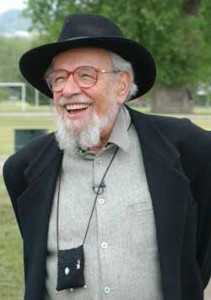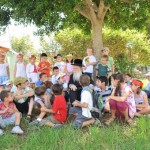Reb Zalman Legacy Project, Migdal Ohr

> What is authentic Judaism ? <
The Reb Zalman Legacy Project is a collaborative effort of the Yesod Foundation and Naropa University to preserve, develop and disseminate the teachings of Rabbi Zalman Schachter-Shalomi, better known as „Reb Zalman,“ an innovative leader in ecumenical dialogue and founder of the Jewish Renewal and Spiritual Eldering movements.
To this end, we hope to develop a unique on-line educational tool, giving users access to a virtual library of profound dimensions; a physical archival collection housed at Naropa University, providing a beautiful space for study, contemplation, and spiritual fellowship; a Contemplative Judaism M.A. program based on Reb Zalman’s teachings at Naropa University; ecumenical, spiritual direction, and eldering workshops; and new books, booklets, CDs, and DVDs, developed from the wealth of Reb Zalman’s material archive.
Important areas of intellectual and spiritual development to us are Deep Ecumenism (inter-religious dialogue), Paradigm Shift, Contemplative Practices, Ecology and Gaian Awareness, Spiritual Eldering, Psychology of Religion, Transpersonal Sociology, Jewish Mysticism, Hasidism, Jewish Renewal, Storytelling, and Sacred Music.
The Reb Zalman Legacy Project is a container that supports the evolving understanding of all of these ideas with the teachings of Reb Zalman as its core and foundation. We intend to preserve not only Reb Zalman’s body of work, but also his process of renewal, so that his teachings will not become calcified and exist with meaning primarily for our generation alone. Therefore, with an eye to the future, we are building open access-pathways to primary texts, inviting new commentary, and providing new possibilities for spiritual fellowship. „To Preserve, Develop, and Disseminate“
Reb Zalman Schachter-Shalomi: Healing the Planet, Rabbi Grossman for underprivilged children
Zalman Schachter-Shalomi, better known as „Reb Zalman,“ was born in Zholkiew, Poland, in 1924. Raised largely in Vienna, his family was forced to flee the Nazi oppression in 1938. After almost three years without roots, they finally landed in New York City in 1941, settling in Brooklyn, where young Zalman enrolled in the yeshiva of the Lubavitcher Hasidim. He was ordained by Lubavitch in 1947. He later received his Master of Arts degree in the Psychology of Religion in 1956 from Boston University and a Doctor of Hebrew Letters degree from Hebrew Union College in 1968.
He taught at the University of Manitoba, Canada, from 1956 to 1975 and was Professor of Jewish Mysticism and Psychology of Religion at Temple University until his early retirement in 1987, when he was named professor emeritus. In 1995, he accepted the World Wisdom Chair at Naropa University in Boulder, Colorado, officially retiring from that post in 2004.
Throughout his long career, Reb Zalman has been an unending resource for the world religious community. He is the father of the Jewish Renewal and Spiritual Eldering movements, an active teacher of Hasidism and Jewish Mysticism, and a participant in ecumenical dialogues throughout the world, including the widely influential dialogue with the Dalai Lama, documented in the book, The Jew in the Lotus.
One of the world’s foremost authorities on Hasidism, he is the author of the new book, A Heart Afire: Stories and Teachings of the Early Hasidic Masters (co-authored by Netanel Miles-Yepez), and on Jewish law, he has written, Integral Halachah: Transcending and Including (with Daniel Siegel). Reb Zalman currently lives in Boulder, Colorado, and continues to be active in mentoring his many students the world over.
For a complete biography and chronology of Reb Zalman’s life, please visit our „Life“ page. To see a complete list of Reb Zalman’s published works, see our „Works“ page.
Rabbi Yitzchak Dovid Grossman is a sixth generation Jerusalemite, born in 1946. A dramatic turning point in his life occurred in 1968 when he decided to move to the Lower Galilee town of Migdal Ha’Emek to provide the socio-humanitarian aid sorely needed there.
Migdal Ha’Emek had been established in 1953 as a development town designed to accommodate part of the great influx of Jewish immigrants from the North African countries. The town’s population grew in size much faster than the evolving socio-economic and educational infrastructure. The resulting shortage of jobs and lack of sufficient school facilities and teachers had a devastating effect on the inhabitants. Migdal Ha’Emek quickly became known as one of the prime centers of criminal activity in Israel.
Rabbi Grossman’s arrival on the scene was without fanfare. He had no welcoming committee and no mandate from the people or from the administration. Furthermore, he had no budget nor staff or even an office. He joined in the conversations of idle youth hanging out on the street corners and, after gaining their confidence, began organizing private classes for them. But he knew that to get to the core of the problem, he would have to tackle it at it’s roots.
Rabbi Grossman became a steady and frequent visitor at the town’s discotheques and pubs, engaging the young clientele in dialogues. Slowly but surely the tough exteriors began to peel away and there began to surface the gentle side of the members of the new generation searching for their true identity.
Migdal Ohr (Hebrew for „Tower of Light“) was established in 1972 for the express purpose of providing education and social guidance to the children from underprivileged and troubled homes ifrom across Israel. Overcrowded apartments, one-parent families, homes with drug problems, impoverished, crime-ridden families–these are the target populations from which Migdal Ohr draws its over 6,000 pupils at all levels of the educational spectrum. Its goal – to transform these students into proud and productive citizens of Israel.

Migdal Ohr, Israel’s largest youth village, provides a nurturing home and outstanding education to over 6,500 orphaned, impoverished, underprivileged and new immigrant children. At Migdal Ohr, the children’s individual needs are met with love, warmth and tremendous sensitivity.
The Young Leadership Committee is dedicated to upholding the values and promoting the mission of Migdal Ohr. By developing creative programming, the Committee attracts young Jewish professionals, educates them about our mission, and encourages increased involvement.
The Young Leadership Committee is open to everyone interested in generating awareness for Migdal Ohr and affecting change in the lives of others. Our dynamic members come from varied backgrounds, and offer a broad range of perspectives and experiences. Together we plan and attend fundraisers and social events, meet hundreds of young adults in the New York area, and, best of all, help save children in Israel.
MIGDAL OHR EDUCATIONAL CENTER – The following is a brief description of some of the educational and social facilities provided by Migdal Ohr:
-
(a) Day Care Centers which provide tender, loving care to infants aged three months to three years old. These facilities offer the mothers of large families the opportunity to work and help their husbands support their children.
-
(b) Kindergartens, where pre-school age children get a proper start on the educational path.
-
(c) Primary and Secondary school systems, for boys and for girls, with full dormitory facilities, laboratories, computer centers, libraries, and youth centers, where emphasis is placed on individual attention to the child’s needs.
-
(d) Teachers‘ Seminary for single and married men, to develop the rabbis, educators, school administrators and rabbinical court judges required by Israeli society.
-
(e) Prisoner rehabilitation programs in Israel’s prisons. The recidivism rate among the „graduates“ of Migdal Ohr’s rehabilitation activities stands at about 10%, a sharp contrast to the 90% in the general prison population.
-
(f) Occupational Training Center offering adult education courses responsive to the requirements of government and industry for off-campus residents of northern Israel. Courses fall into three categories:
-
(I) OCCUPATIONAL DIPLOMA COURSES
-
(II) EDUCATION EXTENSION COURSES
-
(III) COMMUNITY ACTIVITIES
Comments are closed.